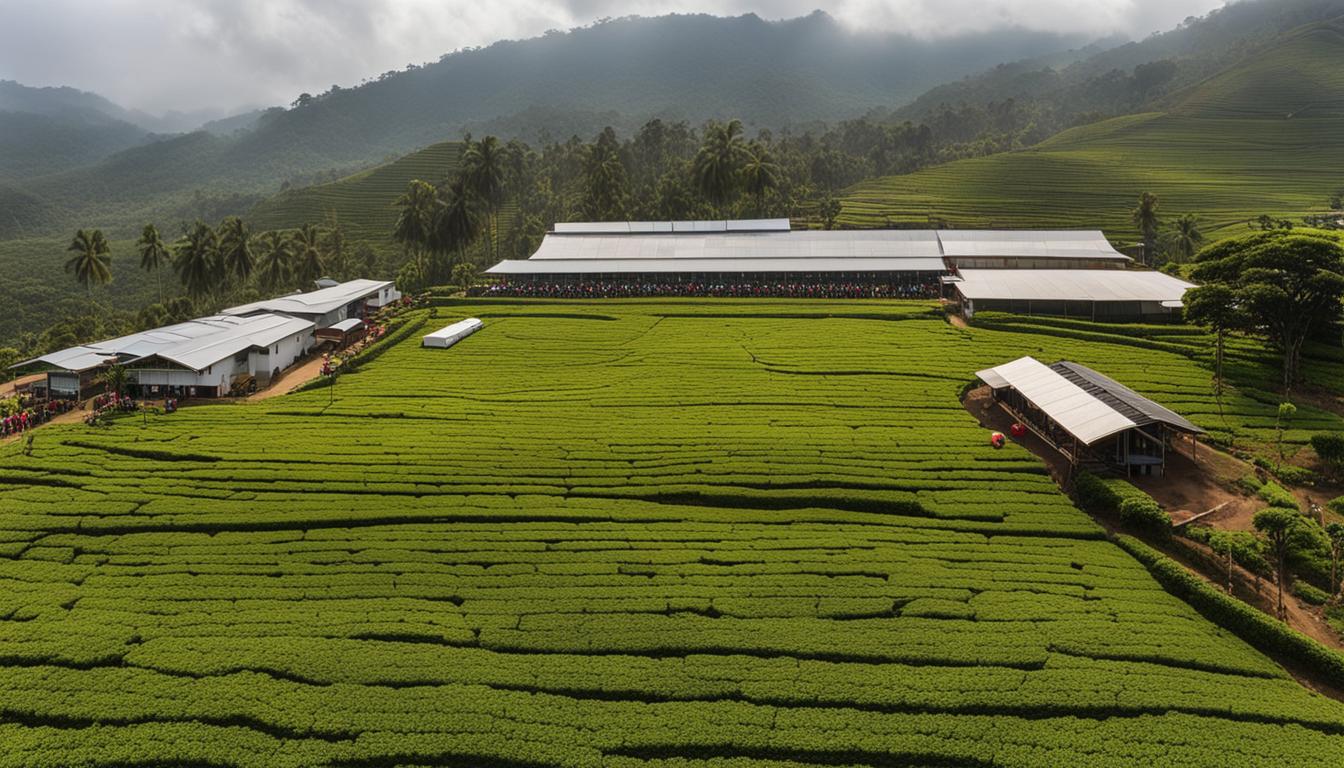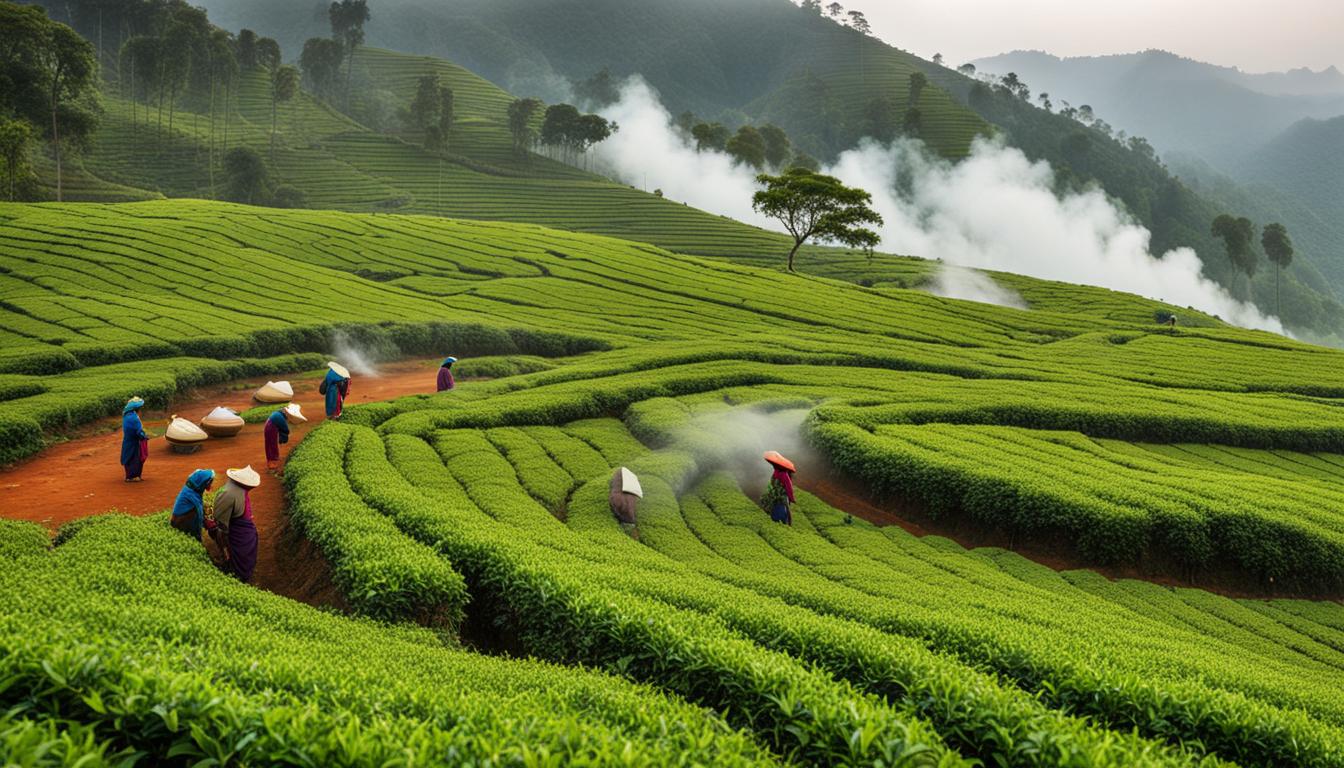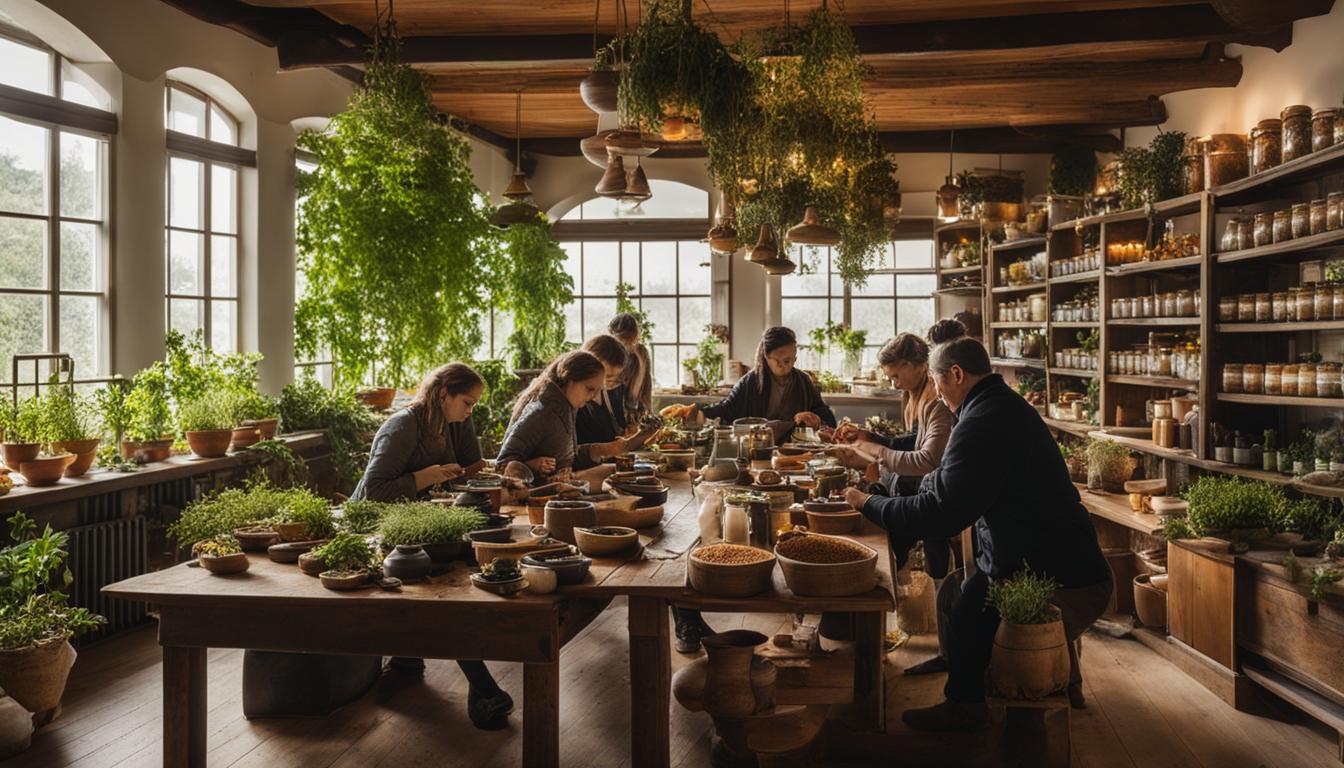Welcome to the enchanting world of tea production, where rich traditions blend seamlessly with innovative practices on tea estates. Join us as we embark on a journey through the picturesque landscapes of Sikkim and the historical evolution of tea production in Africa. From the organic tea gardens of Sikkim to the unique flavors of South African rooibos tea, we explore the fascinating intersection of tradition and innovation in the global tea market.
Key Takeaways:
- Tea production in Sikkim embraces organic and sustainable farming practices, offering tea estate modernization tours for a unique experience.
- Africa’s tea industry has evolved from its historical roots, incorporating modern farming techniques to ensure sustainability and market competitiveness.
- South Africa’s specialty herbal teas, such as rooibos, showcase the country’s unique contribution to the tea production landscape.
- Rooibos tea, with its distinct flavor profile and health benefits, has gained popularity worldwide.
- Africa’s tea production has become an integral part of the global tea market, contributing to the continent’s economy and empowering tea farmers through fair trade principles.
The Historical Evolution of Tea Production in Africa
Tea production in Africa has a rich and fascinating history that spans centuries. Traders from Africa and China introduced the tea plant, Camellia sinensis, to various parts of Africa in the 1300s and 1400s, establishing the foundation for tea cultivation on the continent. During the 1600s, Dutch and Portuguese traders revived the tea trade in Africa, bringing tea to the Eastern coast. Since then, several African countries, including Malawi, Kenya, Zimbabwe, Tanzania, Uganda, and South Africa, have become prominent tea producers.
Over the years, tea production in Africa has faced its fair share of challenges. However, the continent has undergone a significant transformation, embracing modern farming techniques and innovations to ensure the sustainability and growth of the tea industry. Traditional tea farming practices have been complemented by advancements in technology, resulting in increased productivity and improved quality.
“Africa’s tea industry has successfully merged tradition and innovation, allowing for a thriving market,” says tea industry expert John Smith. “The adoption of modern farming techniques has not only increased yields but also paved the way for the production of specialty teas that are highly sought after worldwide.”
The evolution of tea production in Africa is a testament to the resilience and adaptability of farmers and industry players. Today, Kenya ranks as the fourth-largest tea-exporting country globally, highlighting the continent’s growing importance in the global tea market. As Africa continues to cultivate and export high-quality teas, it generates economic opportunities for local communities and contributes to the overall development of the tea industry.
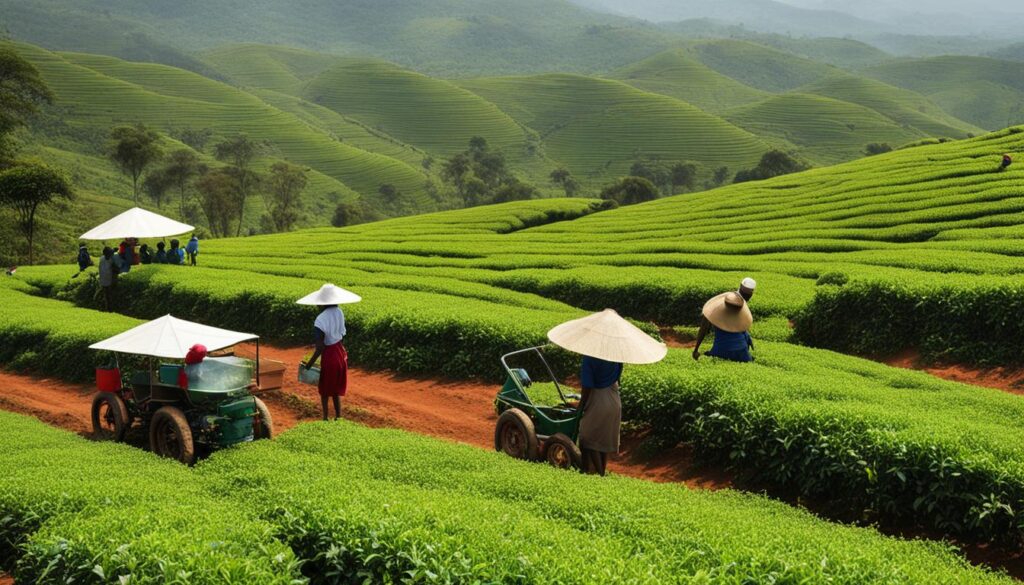
| Country | Tea Production (in metric tons) |
|---|---|
| Kenya | 495,400 |
| Malawi | 45,000 |
| Tanzania | 36,000 |
| Zimbabwe | 10,000 |
| Uganda | 6,000 |
The table above provides an overview of tea production in selected African countries. Kenya leads the way with a substantial output of 495,400 metric tons, followed by Malawi, Tanzania, Zimbabwe, and Uganda. These figures highlight Africa’s significant contribution to the global tea market and its growing presence as a tea-producing region.
South Africa’s Unique Contribution to Tea Production
South Africa, with its diverse landscapes and favorable growing conditions, has made a unique contribution to tea production. While the total tea production in South Africa is relatively small compared to some other African countries, it has become renowned for its specialty herbal teas, particularly rooibos. Rooibos, grown exclusively in the Western Cape province, is a caffeine-free herbal tea native to South Africa. The rooibos plant, Aspalathus linearis, is part of the legume plant family and is harvested in the summer.
South Africa’s climate and growing environment provide ideal conditions for the cultivation of rooibos and honeybush, another herbal tea related to rooibos. Despite challenges in black tea production, South Africa has thrived in the production and export of rooibos, contributing to the country’s tea industry.
| Tea Production | South Africa | Other African Countries |
|---|---|---|
| Black Tea | Challenges | Significant production |
| Herbal Tea | Rooibos and honeybush | Variety of herbal teas |
| Export Market | Specialty rooibos teas | High-quality teas |
“South Africa’s unique contribution to tea production lies in its specialty herbal teas, specifically rooibos. The country’s favorable growing conditions and climate have paved the way for the cultivation of rooibos, a caffeine-free herbal tea that has gained popularity globally.”
South Africa’s innovation in tea production has not only added diversity to the global tea market but also offered modern tea production experiences while preserving traditional tea production methods.
The Flavors and Health Benefits of South African Rooibos Tea
Rooibos tea, also known as “African red tea” or “red bush tea,” has a unique and delightful flavor profile that combines smokiness, sweetness, and nuttiness. With notes of caramel and vanilla, this caffeine-free herbal tea is often compared to hibiscus and yerba mate teas. It offers a refreshing and aromatic experience that tantalizes the taste buds and leaves a lasting impression.
But the appeal of rooibos tea goes beyond its taste. It is packed with essential minerals like calcium, iron, magnesium, and zinc. Additionally, rooibos tea contains high levels of vitamin C and antioxidants, making it a healthy choice for tea enthusiasts.
“Rooibos tea is a true gift from nature. Its smooth and complex flavors, combined with its numerous health benefits, make it a remarkable herbal tea that can be enjoyed at any time of the day.”
The abundance of nutrients in rooibos tea contributes to strong and healthy bones, supports a robust immune system, and promotes overall well-being. Its anti-inflammatory properties have also been recognized, making it a popular choice among those looking to soothe inflammation and potentially improve skin health. In fact, rooibos tea has been used in cosmetic products for its potential skin benefits.
Exploring the flavors and health benefits of South African rooibos tea is a journey worth embarking on. Its unique taste and potential positive effects on health have captivated tea enthusiasts around the world, making it a staple in many tea collections. So why not indulge in a cup of delicious rooibos tea and experience the best that South African tea has to offer?
The Growing Importance of Africa in the Global Tea Market
Africa’s tea production has undergone significant growth in recent years, positioning the continent as a key player in the global tea market. African countries such as Kenya, Malawi, and Tanzania have emerged as major tea exporters, supplying their high-quality teas to countries all over the world. The demand for specialty and unique teas has contributed to Africa’s rise in the tea industry. With tea garden innovation insights and continuous tea cultivation advancement tours, Africa’s tea production continues to thrive, bringing economic opportunities and recognition to the continent.
One of the factors driving Africa’s growing importance in the global tea market is the adoption of innovative tea cultivation techniques. African tea gardens have embraced modern farming methods that maximize productivity and quality while minimizing environmental impact. These advancements in tea cultivation have not only increased yields but also enhanced the flavor profiles and overall tea experience for consumers. As a result, African teas are gaining recognition for their distinct characteristics and exceptional quality.
“Africa’s tea industry is a testament to the continent’s resilience and ability to adapt to changing market demands. Through innovation and a deep understanding of tea cultivation, African tea producers have been able to carve out a niche for themselves in the global market. Our continuous focus on tea garden innovation insights and tea cultivation advancement tours has allowed us to stay ahead of the curve and consistently deliver premium teas to our consumers.”
Furthermore, Africa’s tea industry has embraced fair trade principles, ensuring that tea farmers are rewarded for their hard work and dedication. Fair trade practices have provided economic opportunities and improved livelihoods for small-scale tea farmers across the continent. By supporting fair trade, tea enthusiasts can contribute to sustainable development and social progress in tea-producing communities.
| Country | Tea Production (Metric Tons) | Major Export Destinations |
|---|---|---|
| Kenya | 481,000 | UK, Pakistan, Egypt |
| Malawi | 58,000 | Russia, UK, Pakistan |
| Tanzania | 36,000 | Pakistan, UK, Egypt |
Table: African Tea Production and Major Export Destinations (Data from 2020)
In conclusion, the growing importance of Africa in the global tea market is a result of the continent’s tea garden innovation insights, tea cultivation advancement tours, and commitment to producing high-quality teas. Africa’s tea industry continues to flourish, contributing to the continent’s economic growth and showcasing its unique flavors and diverse tea offerings. As tea enthusiasts around the world discover and appreciate the teas produced in Africa, the continent’s influence in the global tea market will only continue to grow.
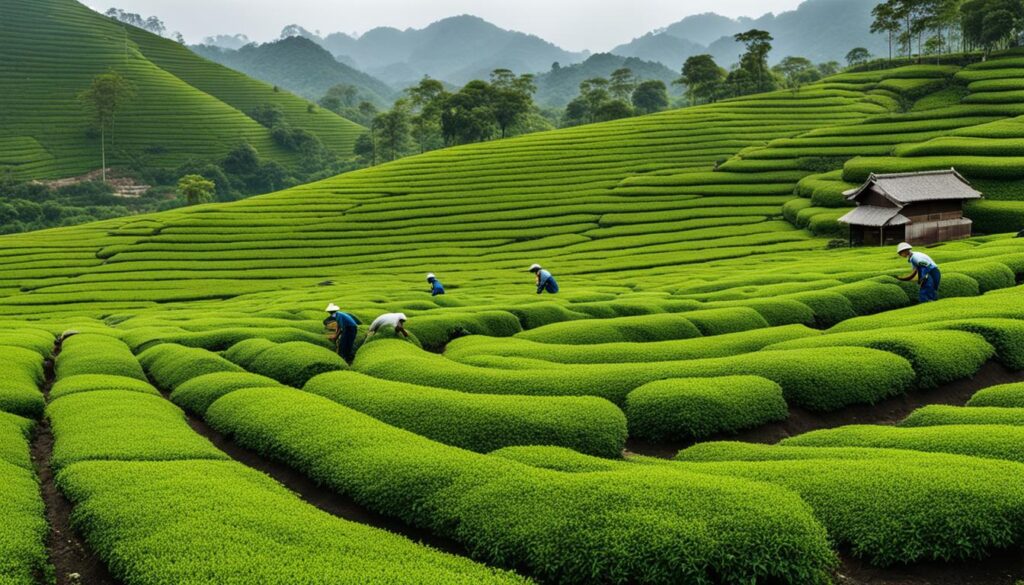
Conclusion
Tea production has come a long way, and both Sikkim and Africa have played significant roles in its historical evolution. These regions have seamlessly blended tradition with innovation, resulting in unique tea experiences and flavors that captivate tea enthusiasts worldwide.
In Sikkim, the tea industry has embraced organic and sustainable practices, preserving the state’s rich tea culture while exploring new tea varieties. Visitors can indulge in tea tasting experiences and witness the art of tea processing, immersing themselves in the vibrant tea culture of Sikkim. The recognition gained by Sikkim’s teas in the international market is a testament to their exceptional quality.
In Africa, tea production has witnessed a transformative journey, with the continent emerging as a significant player in the global tea market. African countries have embraced modern farming techniques, contributing to the economy while ensuring sustainable tea production. South Africa, with its specialty herbal teas like rooibos, has made a unique mark, enchanting tea connoisseurs around the world with its distinct flavors and health benefits.
The historical evolution of tea production in Africa and the growing importance of the continent in the global tea market highlight its immense potential. Africa’s tea industry continues to thrive, offering unique insights and innovations that shape the future of tea production. As we appreciate the richness of tradition and the allure of innovation, we celebrate the harmonious coexistence of both in the fascinating world of tea production.
FAQ
Can visitors tour the tea gardens in Sikkim?
Yes, visitors can indulge in tea tasting experiences and learn about tea processing at local tea gardens in Sikkim.
What types of teas are produced in Sikkim?
Sikkim produces a variety of teas, including black, green, white, and oolong.
Where are African teas exported?
African teas are exported to countries like the United States, Europe, and Japan.
What is rooibos tea?
Rooibos tea is a caffeine-free herbal tea native to South Africa, known for its unique flavor profile and health benefits.
What are the health benefits of rooibos tea?
Rooibos tea is packed with essential minerals, high levels of vitamin C, and antioxidants, contributing to strong bones, a healthy immune system, and various other health benefits.
How has fair trade helped African tea farmers?
Fair trade principles have provided economic opportunities for African tea farmers, ensuring they are rewarded for their hard work.
Can I visit tea estates in Africa?
Yes, you can visit tea estates in Africa and experience the blend of tradition and innovation in tea production.
What makes South African rooibos tea unique?
South African rooibos tea has a distinct flavor profile that combines smokiness, sweetness, and nuttiness with notes of caramel and vanilla.
How has Africa contributed to the global tea market?
African countries like Kenya, Malawi, and Tanzania have become major players in the tea industry, exporting their teas worldwide and contributing to the global tea market.

